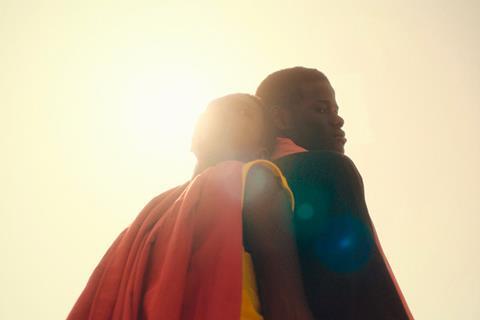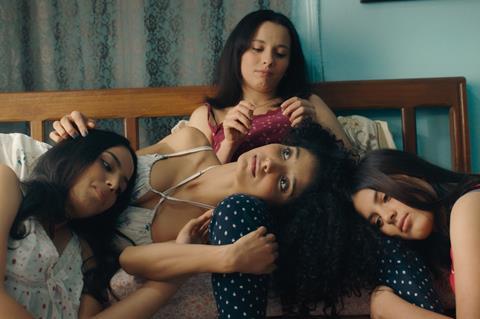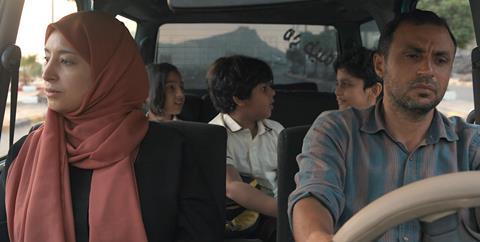The Africa and Middle East regions together scored just one spot on the Oscar shortlist of 15 titles last year — with Morocco’s The Blue Caftan — and no nominations. Screen looks at this year’s contenders.

Africa
The world’s second-most-populous continent looks to new and infrequent Oscar entrants to revive its hopes, having received no nominations last year and just one spot on the 15-strong international feature shortlist (Morocco’s The Blue Caftan). There is work to be done for the international award to fully represent Africa: its countries have only been nominated 10 times, with five of these for Algeria — compared with 239 competitive nominations from Europe. But African entries are up from eight last year to 11, only one down on the record of 12 for the 2021 awards.
Leading the 2024 cohort is Ramata-Toulaye Sy’s Senegalese entry Banel & Adama, about a married couple who come together against their village’s expectations. The sole debut feature in this year’s Cannes Competition, it also made French-Senegalese filmmaker Sy only the second Black female director to compete for the Palme d’Or, after Mati Diop with Atlantics. That film was also a Senegalese Oscar entry, making the shortlist for the 2020 awards and for many a surprise omission from the nominations. French-Senegalese co-production Banel & Adama has global pedigree, backed by Qatar’s Doha Film Institute and having played festivals in Munich, Jerusalem, Melbourne, Toronto, London and Chicago.
Namibia — a country bigger in area than France, Spain or Germany, but with a population under 3 million — makes its first-ever Oscar submission with supernatural noir Under The Hanging Tree. Directed by Namibian-British filmmaker Perivi Katjavivi and launched at International Film Festival Rotterdam in January, the film follows a police officer who struggles to unite a small town following the murder of a German farmer.
Sudan makes only its second entry to the award with Mohamed Kordofani’s Goodbye Julia, having previously submitted for the 2021 ceremony. This debut feature takes in religious persecution and societal racism, in the story of a singer seeking redemption for a death she caused, set in the years prior to the 2011 secession of South Sudan. The film’s Un Certain Regard launch at Cannes, followed by festival berths at Karlovy Vary, Chicago and BFI London, have spread the word.
Religion is also a focus of Apolline Traoré’s Berlinale Panorama entry Sira, as a young nomad takes a stand against Islamist terror after an attack. The film is Burkina Faso’s second submission — 34 years after its first, Tilai, from the late Idrissa Ouedraogo.
Known in his country’s Nollywood industry, Nigerian writer/director CJ ‘Fiery’ Obasi has a platform for international recognition with his third feature, black-and-white fantasy thriller Mami Wata. It won the world cinema dramatic special jury award on debut at Sundance in January for Lilis Soares’ cinematography. This is Nigeria’s best chance yet of Oscar recognition, with the country’s first entry in 2020 disqualified and The Milkmaid not making the 2021 shortlist.
Former winner

With no Ivorian or Algerian entries, South Africa is the only African former winner to submit this year, having taken the 2006 prize for Gavin Hood’s Tsotsi. Hopes rest on Mpumi Mbele’s documentary Music Is My Life, about the late Joseph Shabalala, founder of iconic choral group Ladysmith Black Mambazo — with appearances from Oprah Winfrey, Dolly Parton and Paul Simon adding star power.
Kenya submits for the seventh year in a row, and eighth time in total, with Daudi Anguka’s Mvera, about a woman who uncovers an organ-trafficking ring in her community. Cameroon’s Enah Johnscott becomes the first director to represent his country twice, this time with Half Heaven, which depicts an encounter between a sex worker and a pastor. Johnscott previously directed 2021 submission The Fisherman’s Diary, one of five entries from the country with no nominations so far.
North African films have typically had wider play at international festivals than their counterparts from the south, even if Oscar success has been limited. Kaouther Ben Hania scored the continent’s most recent nomination in 2021 for The Man Who Sold His Skin — Tunisia’s sole nomination from nine entries. Ben Hania is back for 2024 with Four Daughters, a docu-drama examining how a mother’s two eldest daughters were radicalised. A Cannes Competition title, it shared the l’Oeil d’Or documentary prize with Asmae El Moudir’s Un Certain Regard entry The Mother Of All Lies, and releases in the US via Kino Lorber. El Moudir’s film, about working-class riots in Casablanca in 1981, is Morocco’s Oscar submission, looking to go further than The Blue Caftan’s shortlisting last year.
Egyptian producer Mohamed Hefzy lends weight to his country’s entry, Omar Hilal’s sports comedy Voy! Voy! Voy!, about a security guard who feigns a disability to enter the visually impaired World Cup. This is Egypt’s 37th Oscar entry; it has yet to reach even the shortlists, despite submissions by luminaries such as Youssef Chahine and Salah Abu Seif.
Middle East

Conflict casts a terrible shadow over cinema activity in the Middle East. Although the region’s eight submissions were all made before the Hamas attacks of October 7 and subsequent Israeli invasion of Gaza, any awards celebration may be muted in the context of the ongoing violent divisions.
Actress Hiam Abbass — recently seen as Marcia Roy in HBO’s Succession — is the subject of Palestinian entry Bye Bye Tiberias, as her daughter, director Lina Soualem, documents several generations of women in their family. A Palestinian-French co-production, it debuted in Giornate degli Autori at Venice, and won the Grierson Award for best documentary at BFI London. It is the nation’s 16th Oscar entry, with no shortlist recognition yet.
Automatically entered for Israel through winning best film at the country’s Ophir awards, Ayelet Menahemi’s wedding comedy Seven Blessings aims to become the first nominated Israeli submission since Joseph Cedar’s Footnote in 2012 — one of 10 nominations for the country, with no wins so far. Its title refers to the wedding recitals for a bride and her groom under Jewish law.
Yemen’s entry The Burdened has overcome significant challenges to exist at all. It shot over 70 days in the port city of Aden in late 2021, with gun battles pausing production for a week at one stage. The film centres on a couple with three children who, when the mother falls pregnant again, search for an abortion — a dangerous topic in Yemen, where almost all such procedures are illegal. The Burdened debuted in Berlin’s Panorama strand this year, before winning awards at Taipei, Durban and Chicago. It is the country’s third Oscar entry, with writer/director Amr Gamal also having made the second, 2019’s 10 Days Before The Wedding.
In Jordanian entry Inshallah A Boy, a widow fights against the country’s laws — guided by Islamic Sharia jurisprudence — that give her late husband’s family a share of his inheritance if she does not have a son. Debut director Amjad Al-Rasheed was named a Screen Arab Star of Tomorrow in 2016; a Critics’ Week launch this year saw Inshallah A Boy become the first Jordanian film to play Cannes, and Greenwich Entertainment has US rights. The country has one nomination from six previous entries, for Naji Abu Nowar’s Theeb in 2016.
State control
Cinema remains in a perilous state in Iran, with multiple filmmakers arrested in the past 18 months, including Jafar Panahi, whose The White Balloon was the county’s 1996 Oscar submission. This has not stopped the country from looking to extend a strong Oscar tradition: 2024 entry The Night Guardian, about a rural worker looking for a day job in the city, is the third time Reza Mirkarimi has represented his nation after So Close, So Far in 2006 and Today in 2015. Asghar Farhadi’s A Separation and The Salesman won the Oscar in 2012 and 2017 respectively.
Iraq does not have a pedigree to match its neighbour, having failed to reach the shortlist with its 11 previous entries. Looking to break new ground for 2024 is Ahmed Yassin Al Daradji’s Hanging Gardens, about an Iraqi rubbish picker who finds a discarded sex doll. After a Horizons Extra debut at Venice 2022, the film won two prizes at Red Sea International Film Festival last December.
That festival is evidence of Saudi Arabia’s expanding film culture; the nation is now submitting to the Oscars for the fifth time in a row, and seventh in total. Adbulelah Alqurashi’s Alhamour H.A. is a crime comedy about a security guard who gets rich by convincing people into dubious investments.
Bridging the Asia-Europe border, Turkey has entered Nuri Bilge Ceylan’s About Dry Grasses, in which a teacher longs to escape small-town life for Istanbul — winner of the best actress prize for Merve Dizdar at its Cannes launch. Released in the US by Sideshow and Janus Films following berths at Toronto and New York, the drama represents a sixth time representing his country for Ceylan, including the only one of Turkey’s 29 previous entries to make the Oscars shortlist — Three Monkeys in 2009.

























No comments yet